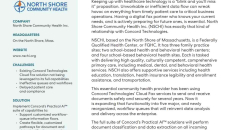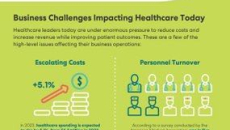Interoperability
SPONSORED
North Shore Community Health Inc. (NSCHI) is a Federally Qualified Health Center (FQHC) based on the North Shore of Massachusetts offering medical, dental, behavioral health and supportive services. NSCHI is implementing a full suite of Concord Practical AI™ solutions that will create flexible, customized pathways for document classification and data extraction and delivery.
SPONSORED
This KLAS Research Performance Report on next-generation digital fax revealed that advanced users were not fully leveraging the capabilities of their digital fax solutions. In addition, they reported that deployment is still a challenge. That said, advanced users see digital fax as a long-term fixture in their organizations and a critical component of their interoperability strategy.
SPONSORED
Healthcare organizations (HCOs) continue to face business challenges such as escalating costs, personnel turnover and the difficulty of querying and electronically receiving unstructured patient data.
Also, athenahealth intros athenaOne for Behavioral Health, and Clarify Health empowers payers with AI-driven cost containment tools and quality improvement analytics.
Through a successful referral coordination pilot with Epic, MedAllies, OCHIN and others, doctors can receive automated updates on their behavioral health referrals, regardless of their EHR, while reducing mental health clinicians' burdens.
Longitude Health says it plans to invest in solutions to address healthcare's most complex challenges.
The association worries over the higher accountability standard for data sharing imposed on providers compared to payers. "Providers would still be held to a higher accountability standard," the AHA writes.
HIMSS24 APAC
A senior consultant for the Saudi Arabia Ministry of Health has also emphasised incorporating governance from the outset.
HIMSS24 APAC
Health leaders in Taiwan, South Korea, and Singapore share insights in resolving big data exchange and precision medicine hurdles.
Also, Western Australia is seeking vendors to deliver its statewide EMR.










